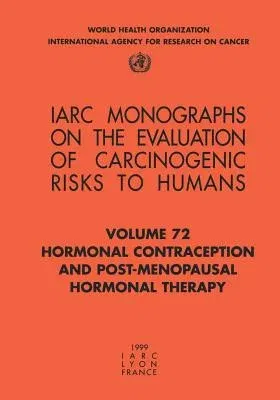Evaluates evidence for an increased risk of cancer in women using
combined oral contraceptives, progestogen-only hormonal contraceptives,
post-menopausal estrogen therapy, and post-menopausal
estrogen-progestogen therapy. Although the carcinogenicity of these
preparations has been extensively investigated, the book stresses the
many complex methodological issues that must be considered when
interpreting findings and weighing results. Evidence of an association
between use of these preparations and positive effects on health,
including a reduced risk of some cancers, is also critically assessed.
The first and most extensive monograph evaluates evidence of an
association between the use of combined oral contraceptives and cancer
at nine sites. Concerning breast cancer, the evaluation concludes that,
even if the association is causal, the excess risk for breast cancer
associated with patterns of use that are typical today is very small.
Studies of predominantly high-dose preparations found an increased risk
of hepatocellular carcinoma in the absence of hepatitis viruses. Citing
these findings, the evaluation concludes that there is sufficient
evidence in humans for the carcinogenicity of combined oral
contraceptives. The evaluation also found sufficient evidence for the
carcinogenicity of some, but not all, combined preparations in animals.
Combined oral contraceptives were classified as carcinogenic to humans.
The evaluation also cites conclusive evidence that these agents have a
protective effect against cancers of the ovary and endometrium.
Progestogen-only contraceptives are evaluated in the second monograph,
which considers the association with cancer at six sites. The evaluation
found no evidence of an increased risk for breast cancer. Although the
evaluation found sufficient evidence in animals for the carcinogenicity
of medroxyprogesterone acetate, evidence for the carcinogenicity of
progestogen-only contraceptives in humans was judged inadequate.
Progestogen-only contraceptives were classified as possibly carcinogenic
to humans.
The third monograph, on post-menopausal estrogen therapy, considers
evidence of an association with cancer at eight sites. Findings from a
large number of epidemiological studies indicate a small increase in the
risk of breast cancer in women who have used these preparations for five
years or more. Studies consistently show an association between use of
post-menopausal estrogen therapy and an increased risk for endometrial
cancer. Data on the association with other cancers were either
inconclusive or suggested no effect on risk. The evaluation concludes
that post-menopausal estrogen therapy is carcinogenic to humans. The
final monograph evaluates the association between the use of
post-menopausal estrogen-progestogen therapy and cancer at four sites.
The evaluation of limited data on breast cancer found an increased
relative risk observed with long-term use. Data were judged insufficient
to assess the effects of past use and of different progestogen
compounds, doses, and treatment schedules. For endometrial cancer, the
evaluation found an increase in risk relative to non-users when the
progestogen was added to the cycle for 10 days or fewer. Post-menopausal
estrogen-progestogen therapy was classified as possibly carcinogenic to
humans. Concerning post-menopausal therapy in general, the book notes
that evidence of carcinogenic risks must be placed in perspective of
potential benefits. The prevention of osteoporotic fractures is cited as
the best-established benefit. Evidence also suggests that estrogen
prevents heart disease and may prevent memory loss and dementia.

